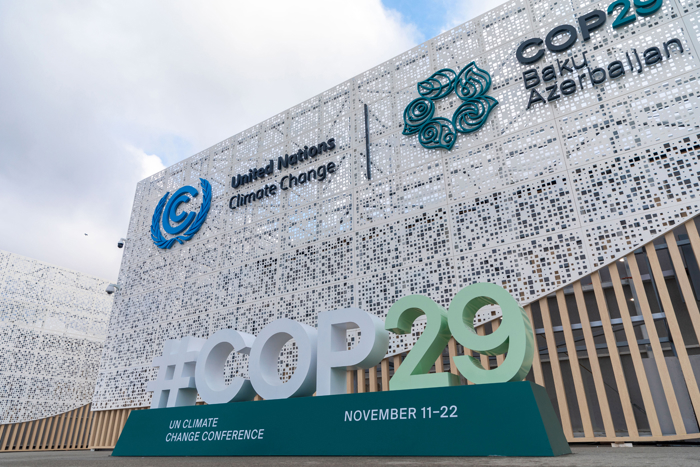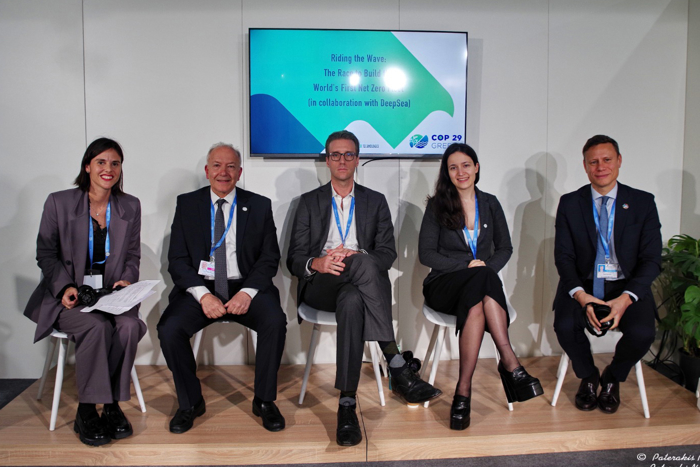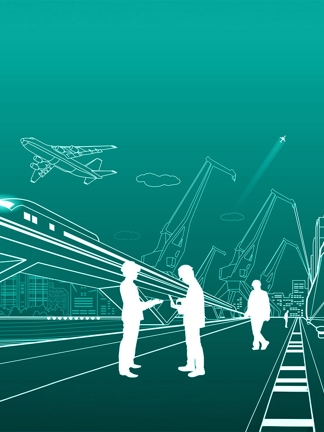As the dust settles on COP29, reactions have been mixed. Yet for the maritime sector, there are reasons to be cautiously optimistic says James Forsdyke, LR Maritime Decarbonisation Hub’s Managing Director.
After attending the annual climate change conference in Baku, Azerbaijan last month, Forsdyke tells Horizons: Maritime is performing well compared to other hard-to-abate sectors.

“We have a global regulator – the IMO – with a climate strategy and a suite of regulatory instruments, including EEDI, EEXI, CII, and hopefully by MEPC 83 also the finalised mid-term measures including a fuel standard and pricing mechanisms. No other hard-to-abate sector can claim such a cohesive international framework.”
Significant tangible outcomes of COP29 include a $300 billion annual commitment by 2035 for developing nations and the establishment of the Global Carbon Credit Trading System under Article 6.4 of the Paris Agreement.
Whilst the $300 billion falls far short of the climate finance research that pointed to a need for $1 trillion of annual investment, securing this funding is a step forward. The Global Carbon Credit Trading System will enable nations and businesses to trade verified carbon credits under rigorous, transparent rules.
Projects that reduce or remove carbon emissions, like reforestation or renewable energy initiatives, can generate credits for sale to those needing offsets.
Phasing out fossil fuels
COP29 reinforced the urgency of scaling up zero-emission fuels. More than 50 maritime leaders, including the LR Maritime Decarbonisation Hub, signed a Call to Action to achieve 5-10% adoption of green fuels like ammonia and methanol by 2030. “The focus on green corridors and infrastructure aligns with the IMO’s push to accelerate decarbonisation targets,” says Forsdyke. “The 5-10% adoption target by 2030 is now well established as a target tipping point, and initiatives like this one are essential to drive progress towards that target”
While no unified agreement on fossil fuel phase-outs emerged, the discussions took a step forward. “Fossil fuel-dependent economies remain resistant, but the dialogue around subsidies and accountability has strengthened,” Forsdyke observed. “These incremental discussions are vital for shifting the narrative and paving the way for more decisive action.”
To drive the adoption of zero-emission fuels, the Maritime Decarbonisation Hub has launched the Maritime Fuel Supply Dialogues. This multi-stakeholder initiative connects ministries, fuel producers, shipowners, and financial institutions to tackle barriers to scaling zero-emission fuels. It focuses on aligning supply and demand, developing infrastructure, and creating policy incentives. “It’s crucial for ensuring green hydrogen-derived fuels are both available and affordable at scale,” says Forsdyke.
Seafarer training
Justice and equity in the energy transition were prominent topics at COP29, and Forsdyke emphasised the need to integrate safety and human-centric design into the transition.
“Zero-emission fuels and technologies require updated training under the IMO’s Standards of Training, Certification and Watchkeeping for Seafarers (STCW) Convention. Without this, we risk inefficiencies and safety concerns. But we must go further, embedding resilience and operability into Maritime’s safety culture to protect workers while maintaining social mobility,” Forsdyke explains.
COP29 reinforced many of the Maritime Decarbonisation Hub’s priorities, such as advancing fuel adoption programs, developing safety frameworks and scaling investment. However, it also highlighted the need for greater collaboration.
“Aligning shipping’s needs with the broader energy transition is critical. We also see a growing role for the Decarbonisation Hub in navigating the interconnected landscape of both climate finance, and cross sector fuel demand aggregation” says Forsdyke.

Whilst the event did not deliver everything that was hoped for, it helped to shine a spotlight on the maritime industry’s position as a leader among hard-to-abate sectors, which “is a notion not often entertained from within the industry,” Forsdyke tells Horizons.
“With focused effort and unified resolve, the maritime industry can lead by example, proving that even the most challenging sectors can rise to the climate challenge.”










